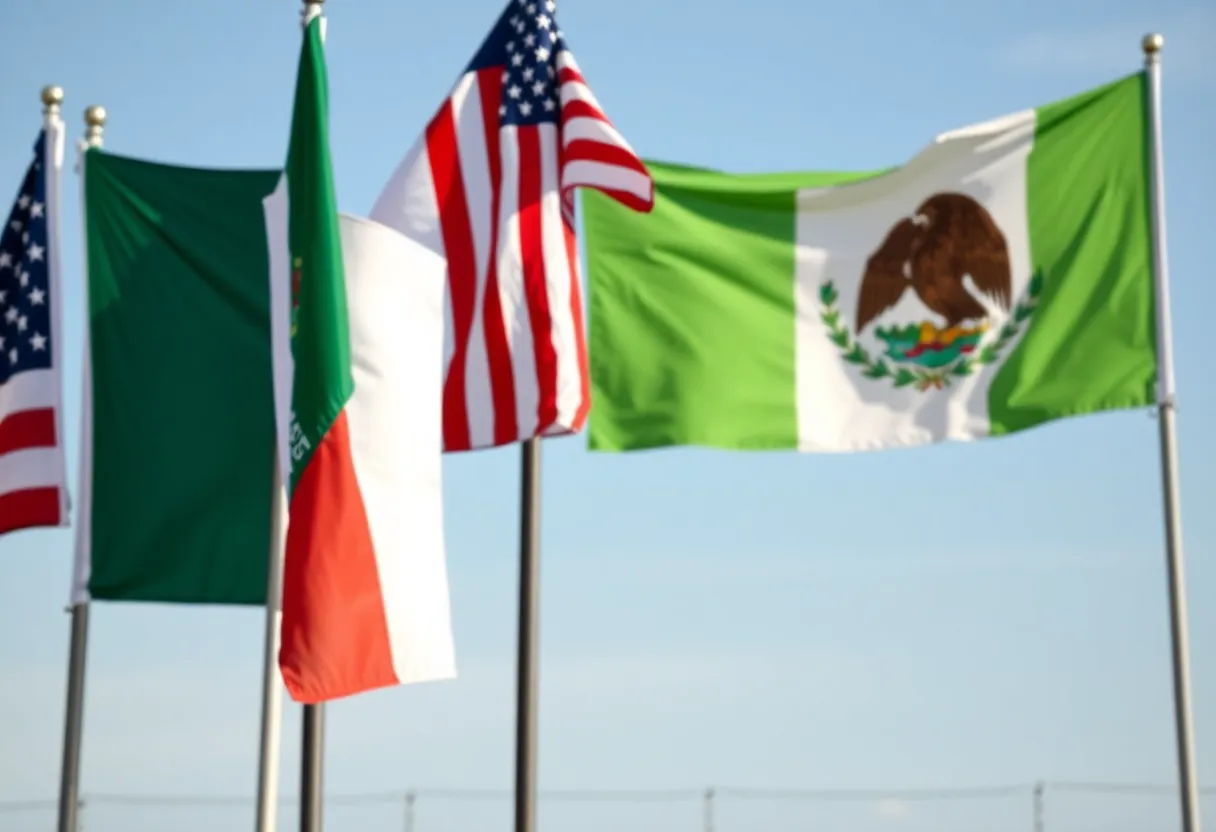News Summary
Mexican President Claudia Sheinbaum has firmly rejected U.S. President Donald Trump’s proposal to send American troops to assist in the fight against drug trafficking. During a recent phone conversation, Sheinbaum emphasized Mexico’s sovereignty and expressed willingness for collaboration on information-sharing instead of military intervention. This response highlights ongoing tensions and the complexities of U.S.-Mexico relations concerning drug-related issues. As military activities near the border intensify, both countries must navigate these challenging discussions while respecting sovereignty and promoting cooperation.
Mexican President Says “No” to U.S. Troops in the Drug War
In a recent public address, Mexican President Claudia Sheinbaum made it crystal clear that she is not on board with U.S. President Donald Trump’s proposal to send American troops into Mexico to help tackle the ongoing issue of drug trafficking. This exchange came to light following a phone call between the two leaders that raised eyebrows and drew attention.
Clash Over Sovereignty
According to reports, during a phone call with President Trump, Sheinbaum was pushed for a more significant U.S. military involvement in Mexico’s struggle against powerful drug cartels. Trump reportedly offered to send U.S. military personnel to assist in countering these criminal organizations. However, Sheinbaum’s response was emphatic—in her view, Mexico’s sovereignty is not something up for negotiation. She made it abundantly clear that this kind of intervention is simply unacceptable.
Background of the Situation
This recent proposal comes against a backdrop of increasing U.S. military activity along the shared border, a move stemming from Trump’s directive earlier this year to bolster military roles in controlling migrant flows. The Trump administration has also labeled several Mexican gangs and cartels as foreign terrorist organizations. This designation is part of a broader strategy to strengthen law enforcement and deliver more resources to those fighting against these groups.
Information Sharing Over Military Action
During the controversial phone conversation, while Sheinbaum made it known that she would not accept military intervention, she did express willingness to collaborate on information-sharing. This kind of partnership could focus on efforts to fight drug trafficking, but she insisted that the U.S. should also take a closer look at the issue of arms trafficking that has been a significant factor contributing to violence in Mexico. The loss of over 450,000 lives over nearly two decades serves as a grim reminder of the challenges both nations face.
U.S. Response and Ongoing Pressures
A spokesperson from the White House National Security Council mentioned that the U.S. is prepared to offer assistance to Mexico and emphasizes the importance of Mexico enhancing its efforts against drug-related issues. However, as Trump has often highlighted, there’s a constant critique directed at Mexico and even Canada about their roles in allowing drugs like fentanyl to flow into the U.S. illegally.
The Military Presence Grows
In recent months, the U.S. military’s activities near the border have intensified. Surveillance flights aimed at monitoring drug trafficking routes have become more common as part of an overarching strategy to maintain what is being touted as “the most secure southwest border in history.” This increase in military presence has raised concerns about potential tensions between the U.S. and Mexico, particularly regarding discussions surrounding immigration and drug policies.
Legal Challenges Awaiting Trump
Simultaneously, Trump is facing legal challenges regarding his immigration policies and plans for deportations. As tensions simmer between the two countries, the handling of these matters will be crucial. The U.S. Department of Defense has already established military zones along the border that serve to enforce immigration laws amid this complex geopolitical landscape.
Conclusion
As this situation evolves, it will be interesting to see how both leaderships navigate these sensitive discussions. Claudia Sheinbaum’s firm stance on sovereignty reflects a broader sentiment that could define U.S.-Mexico relations moving forward. The ongoing tussle over drug trafficking and military involvement not only highlights national priorities but also calls for a collaborative approach to address cross-border challenges in a manner that respects sovereignty and fosters cooperation.
Deeper Dive: News & Info About This Topic
- Al Jazeera
- Wikipedia: Claudia Sheinbaum
- ABC News
- Google Search: Trump Mexico troops
- Newsweek
- Google Scholar: Mexico US troops
- Reuters
- Encyclopedia Britannica: United States
- The Hill
- Google News: drug trafficking Mexico

Author: STAFF HERE FLORENCE WRITER
The FLORENCE STAFF WRITER represents the experienced team at HEREFlorence.com, your go-to source for actionable local news and information in Florence, Florence County, and beyond. Specializing in "news you can use," we cover essential topics like product reviews for personal and business needs, local business directories, politics, real estate trends, neighborhood insights, and state news affecting the area—with deep expertise drawn from years of dedicated reporting and strong community input, including local press releases and business updates. We deliver top reporting on high-value events such as the Florence Festival of Lights, Pee Dee Pride, and agricultural expos at the Florence Center. Our coverage extends to key organizations like the Florence Regional Chamber of Commerce and the Pee Dee Area Council of Governments, plus leading businesses in healthcare and retail that power the local economy such as McLeod Health and Pee Dee Electric Cooperative. As part of the broader HERE network, including HERECharleston.com, HEREColumbia.com, HEREGreenville.com, and HEREHiltonHead.com, we provide comprehensive, credible insights into South Carolina's dynamic landscape.





